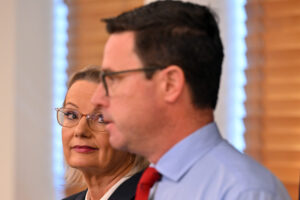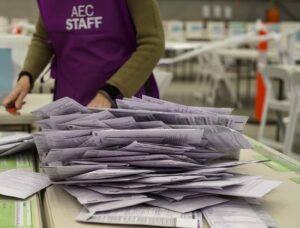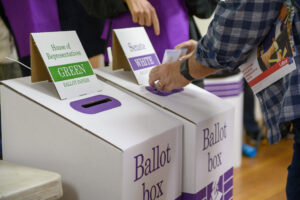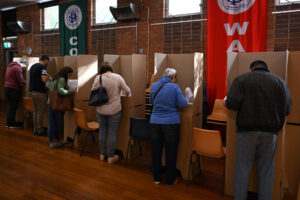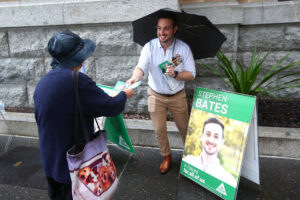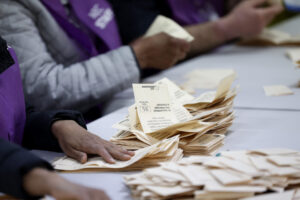August 2025
Landslide Labor win out of proportion to primary vote
Labor won nearly two-thirds of all the seats in the House of Representatives with just over a third of first preferences.
July 2025
Australia has a politician problem: not too many, but too few.
Each of Australia’s 150 members of Parliament (MPs) must split their attention between more constituents than ever before: 120,659 voters per MP, over six thousand more than in 2022.
Australia’s gun laws aren’t as strong as you think
Nearly three decades after the Port Arthur massacre, there are more guns than ever before in Australia and there is still no national firearms register.
Most gambling losses are from at-risk gamblers
Australia has some of the highest rates of gambling in the world, with a third of Australian adults using poker machines at least once a year. But it’s a past-time that could be riskier than you think: At least $10 billion of the $13 billion that Aussies lose on pokies each year comes from exceeding
June 2025
Major parties have never relied more on preferences
At the 2025 federal election, the Albanese Labor Government won over 55% of the two-party preferred vote. The two-party preferred vote, called 2PP, measures whether Australians preferred their Labor candidate or their Liberal–National Coalition candidate. 55% of the 2PP is the party’s best result since 1943. This high 2PP vote disguises a relatively low first-preference
For major party leaders, the Greens, independents and minor parties are the closest threat
Nearly a quarter of all seats in the federal parliament are now “non-classic” seats, where first and second is no longer a fight between the two major parties.
Gender parity closer after federal election but “sufficiently assertive” Liberal women are still outnumbered two to one
Now that the dust has settled on the 2025 federal election, what does it mean for the representation of women in Australian parliaments? In short, there has been a significant improvement at the national level. When we last wrote on this topic, the Australian Senate was majority female but only 40% of House of Representatives
The 2025 federal election is the first where a major party received fewer votes than independents and minor parties.
While the May election result was remarkable for the low vote share going to the major parties, it was just the most recent of a very long trend.
_May 2025
Why the election’s closest seat went unnoticed: Too close to Calwell
Updated 30/05/2025 The outer-Melbourne electorate of Calwell was named “Australia’s most unpredictable seat” by The Age after the election and was – aside from those going to a recount – the last seat to be called. The AEC labelled the counting process for the seat “likely the most complex in Australia’s history”. The count is
The rise of early voting in Australian elections
Are voters missing out on more than their democracy sausage?
April 2025
Election entrée: Longest wait for results
After the 2010 election, independent crossbenchers negotiated for 17 days with Prime Minister Julia Gillard and Opposition Leader Tony Abbott to decide who to support.
At Australian unis, do you get what you pay for?
35 years after the HECS/HELP system began, university students now pay much more for much less.
Election entrée: Preference pile-ons
Last election, independent Kylea Tink won the seat of North Sydney on a primary vote of 25%.
Election entrée: Early voting in Australia
A cornerstone of the Australian election experience is tucking into a democracy sausage after casting your ballot on election day.
Election entrée: Speakers from other parties
Every Australian parliament – federal, state and territory – has had a speaker from a party other than the one in government at some point.
Election entrée: Surprising preference flows
In the 2022 election, the count in the seat of Brisbane was on a knife edge.
Election entrée: First preferences of different governments
It’s funny that we call single-party government “majority” government, because no one party or coalition has won a majority of the first-preference or primary vote since 1975.
Election entrée: Electorates are bigger than ever
In the 2025 Australian election there will be about 120,000 registered voters per elected MP.
Australia’s paper tigers – the state of news competition
A competitive and diverse news industry is key to a democratic society, keeping institutions accountable and transparent. But the ability of Australia’s Fourth Estate to perform that role is increasingly in doubt. Australia was once labelled the “land of the newspaper” by British visitors, with a flourishing and diverse news industry, but for over a
Full preferential voting means you can’t waste your vote
Full preferential voting is a proud Coalition reform – one that benefits every political persuasion Compulsory voting and full preferential voting make up the backbone of Australian democracy, and protect us from voter suppression and disengagement seen in other countries. We owe both to the parties of the centre-right, what would become the Liberal–National Coalition.
General Enquiries
Emily Bird Office Manager
mail@australiainstitute.org.au
Media Enquiries
Glenn Connley Senior Media Advisor
glenn.connley@australiainstitute.org.au

